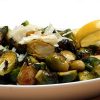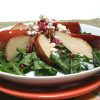The diabetic patient's meal plan should specify that he or she can have specific numbers of exchanges; for example, a typical lunch may allow two bread, two meat, one fat, two vegetable, and one fruit portion. By referring to a list of exchanges, the person can develop his or her own menu. The idea is that by following the exchange system, the person will automatically pirate distribution of carbohydrates, protein, and fats.
Many diabetic patients find the exchange system convenient and workable. For others, however, it is better in theory than in actuality. For example, ethnic and convenience foods may be difficult to find on a standard exchange list. Most processed foods will have a number of different exchanges, and keeping track of them is more than many people can cope with.
Most of the recipes featured in The Diabetic Gourmet Magazine and The Diabetic Newsletter feature exchange information in addition to traditional nutritional information, such as calories, fat, and carbohydrates. This should make it easy to incorporate new recipes into your meal plan.
Some dietitians and diabetes educators stress working with exchanges; others will teach patients how to estimate percentages of carbohydrates, fats and protein in a meal and then tailor portions to fit their overall meal plan. In either event, the meal plan should be based on a system that the patient (or person who prepares the meals) understands. It also should take into account individual food preferences and lifestyles.
Within each group below, the foods can be exchanged for each other. You can use the lists below to give yourself more choices.
| Vegetables Fat-Free and Very Lowfat Milk Very Lean Protein Fruits | Lean Protein Medium Fat Proteins Starches Fats |
Vegetables
Contain 25 calories and 5 grams of carbohydrate.
One serving equals:
| 1/2 cup | Cooked vegetables (carrots, broccoli, zucchini, cabbage, etc.) |
| 1 cup | Raw vegetables or salad greens |
| 1/2 cup | Vegetable juice |
| If you?re hungry, eat more fresh or steamed vegetables. | |
Fat-Free and Very Lowfat Milk
Contain 90 calories per serving.
One serving equals:
| 1 cup | Milk, fat-free or 1% fat |
| 3/4 cup | Yogurt, plain non fat or low fat |
| 1 cup | Yogurt, artificially sweetened |
Very Lean Protein
Choices have 35 calories and 1 gram of fat per serving.
One serving equals:
| 1 ounce | Turkey breast or chicken breast, skin removed |
| 1 ounce | Fish fillet (flounder, sole, scrod, cod, etc.) |
| 1 ounce | Canned tuna in water |
| 1 ounce | Shellfish (clams, lobster, scallop, shrimp) |
| 3/4 cup | Cottage cheese, non fat or low fat |
| 2 each | Egg whites |
| 1/4 cup | Egg substitute |
| 1 ounce | Fat-free cheese |
| 1/2 cup | Beans- cooked (black beans, kidney, chick peas or lentils): count as 1 starch/bread and 1 very lean protein |
Fruits
Contain 15 grams of carbohydrate and 60 calories.
One serving equals:
| 1 small | Apple, banana, orange, nectarine |
| 1 medium | Fresh peach |
| 1 | Kiwi |
| 1/2 | Grapefruit |
| 1/2 | Mango |
| 1 cup | Fresh berries (strawberries, raspberries or blueberries) |
| 1 cup | Fresh melon cubes |
| 1/8 th | Honeydew melon |
| 4 ounces | Unsweetened Juice |
| 4 teaspoons | Jelly or Jam |
Lean Protein
Choices have 55 calories and 2-3 grams of fat per serving.
One serving equals:
| 1 ounce | Chicken- dark meat, skin removed |
| 1 ounce | Turkey- dark meat, skin removed |
| 1 ounce | Salmon, Swordfish, herring |
| 1 ounce | Lean beef (flank steak, London broil, tenderloin, roast beef)* |
| 1 ounce | Veal, roast or lean chop* |
| 1 ounce | Lamb, roast or lean chop* |
| 1 ounce | Pork, tenderloin or fresh ham* |
| 1 ounce | Low fat cheese (3 grams or less of fat per ounce) |
| 1 ounce | Low fat luncheon meats (with 3 grams or less of fat per ounce) |
| 1/4 cup | 4.5% cottage cheese |
| 2 medium | Sardines |
| * Limit to 1-2 times per week | |
Medium Fat Proteins
Choices have 75 calories and 5 grams of fat per serving.
One serving equals:
| 1 ounce | Beef (any prime cut), corned beef, ground beef ** |
| 1 ounce | Pork chop |
| 1 each | Whole egg (medium) ** |
| 1 ounce | Mozzarella cheese |
| 1/4 cup | Ricotta cheese |
| 4 ounces | Tofu (note this is a Heart Healthy choice) |
| ** choose these very infrequently | |
Starches
Contain 15 grams of carbohydrate and 80 calories per serving.
One serving equals:
| 1 slice | Bread (white, pumpernickel, whole wheat, rye) |
| 2 slice | Reduced calorie or "lite" Bread |
| 1/4 (1 Ounce) | Bagel (varies) |
| 1/2 | English muffin |
| 1/2 | Hamburger bun |
| 3/4 cup | Cold cereal |
| 1/3 cup | Rice, brown or white- cooked |
| 1/3 cup | Barley or couscous- cooked |
| 1/3 cup | Legumes (dried beans, peas or lentils)- cooked |
| 1/2 cup | Pasta- cooked |
| 1/2 cup | Bulgar- cooked |
| 1/2 cup | Corn, sweet potato or green peas |
| 3 ounce | Baked sweet or white potato |
| 3/4 ounce | Pretzels |
| 3 cups | Popcorn, hot air popped or microwave (80% light) |
Fats
Contain 45 calories and 5 grams of fat per serving.
One serving equals:
| 1 teaspoon | Oil (vegetable, corn, canola, olive, etc.) |
| 1 teaspoon | Butter |
| 1 teaspoon | Stick margarine |
| 1 teaspoon | Mayonnaise |
| 1 Tablespoon | Reduced fat margarine or mayonnaise |
| 1 Tablespoon | Salad dressing |
| 1 Tablespoon | Cream cheese |
| 2-Tablespoons | Lite cream cheese |
| 1/8th | Avocado |
| 8 large | Black olives |
| 10 large | Stuffed green olives |
| 1 slice | Bacon |
National Heart, Lung and Blood Institute, based on American Dietetic Association Exchange List






